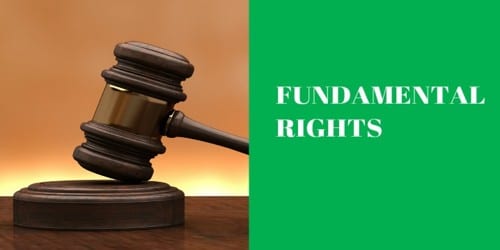Fundamental Rights
As a citizen of a democratic country, we all are privileged to have some fundamental rights. In the absence of these rights, a man’s existence would be worthless. These rights are considered necessary for the development of the personality of an individual. Thus when the political institutions were made, their role and responsibility mainly focused on empowering the people especially the minorities to live in dignity with rights of equality, dignity and religious freedom. Without the enjoyment of these rights, the happiness and development of the individual are not possible.
Fundamental Rights have been classified into 6 categories. Every citizen in a democratic country needs these rights in order to grow as balanced and responsible citizens. These are:
Right to Equality – The constitution guarantees that all citizens will be equally protected by the laws of the country. This states that all the citizens are equal before the law and there can be no discrimination of any manner. It means that the state cannot discriminate against a citizen on the basis of race, caste, sex, religion or place of birth. This right also states that everyone shall have equal access to all public places.
Right to Freedom – It is a cluster of several rights, such as freedom of speech and expression, freedom to move freely throughout the country, freedom to reside and settle in any part of the country and freedom to practice any profession, etc.
Right against Exploitation – This includes the prohibition of any form of forced labor. Children, below the age of 14 years are not allowed to work in mines or factories where the risk of life is involved. Thus, human trafficking & begging have been made legal offenses and those found involved are to be penalized. If this right is violated, one can go to the court of law to get justice.
Right to Freedom of Religion – Every religious denomination has the right to maintain its institutions for religious purposes. All religions shall have a right to establish and uphold institutions for religious and charitable purposes and will be free to manage their own affairs with respect to these.
Cultural and Educational Right – This is one of the most important rights, as education is considered to be the primary right of each child. Cultural right states that every nation wants to preserve its cultural heritage. It allows all the minorities, whether based on language, or religion to establish and administer educational institutions of their choice.
Right to Constitutional Remedy – This right empowers the citizens to go to court in case of denial of any of these fundamental rights. The court stands as a guard against the breach of these rights.
Fundamental rights play a very significant role in the life of a citizen. These rights can defend during the time of difficulty & obscurity and help us grow into a good human being.














